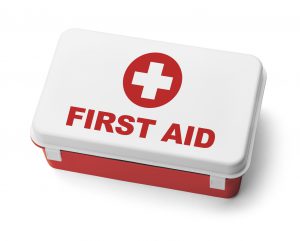Your child just swallowed some some of the cleaning fluid you accidentally left out. Do you know what to do? Poison Control Centers receive over 2 million calls annually, with the largest number of calls for poison exposures in the home to children under the age of 6. While most of these poisonings are non-fatal, it is important to understand 4 keys to keep your family safe: what poisons are, how they enter the body and where they can be found. Additionally, it is important to know what to do in the event of an accidental poisoning to keep your family safe.
What is a poison?
A poison, is anything that makes you sick or hurts you if used the wrong way. Poisons can be liquid, solids, sprays, or gases.
How do poisons enter the body?
Poisons enter the body through the eyes, skin, mouth, and nose, and through stings or bites from insects or animals.
Where can poisons be found?
Poisons can be found in many forms inside and outside of the home, in things such as medications, household and personal care products, pesticides, plants, insects and animals, and environmental hazards.
What to do if a poisoning occurs
The most important thing to do if a poisoning occurs is to remain calm. If the victim is unconscious, has trouble breathing, or is convulsing , call 9-1-1. If not, call the Poison Control Center at 1-800-222-1222, or go online. You can save the poison control contact information in your smartphone by texting “POISON” to 797979.
, call 9-1-1. If not, call the Poison Control Center at 1-800-222-1222, or go online. You can save the poison control contact information in your smartphone by texting “POISON” to 797979.
- If a poison is swallowed, do not do or give anything until instructed by the Poison Control Center.
- If a poison is in the eyes, hold the eyelids open and wash quickly and gently with clear running water for 15 minutes.
- If a poison has been breathed in, carry or drag the victim to fresh air immediately, and loosen any tight clothing. If the victim has stopped breathing or the skin is blue, perform CPR) and call 9-1-1.
- If a poison gets on skin, take off any wet clothing and rinse the skin for 15-20 minutes in the shower or under a faucet. If necessary, call 9-1-1.
Knowing what poisons are, how children can come in contact with them, where to find them, limiting exposure to them, and knowing what to do in case a child comes in contact with them can help keep your young child safe from accidental poisonings. To keep up with the latest poison alerts and information, check out the American Association of Poison Control Centers website.
 0
0
